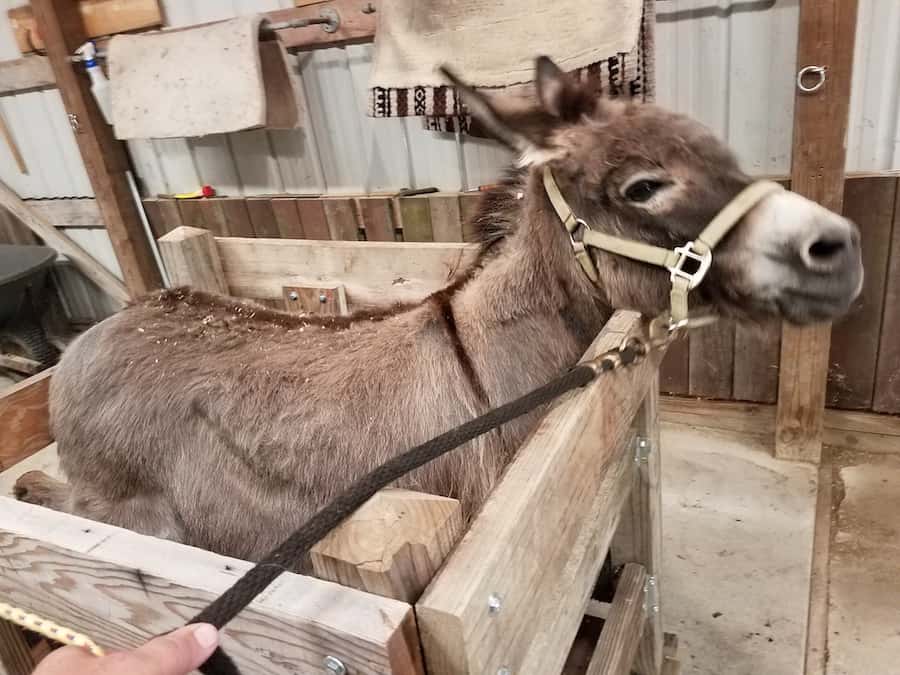Did you know that a miniature donkey can live for more than 30 years? By keeping your mini donkey in good health, you’re looking forward to having many wonderful decades together with your donkey, but you know you must provide them the proper care for that to happen. What should that care entail, exactly? What do mini donkeys need to stay healthy?
Miniature donkeys need the following in their lives to remain the picture of mini donkey health:
- Nutritious diet
- Enclosure
- Exercise
- Mental stimulation
- Veterinary care
In this article, we will explore the above five factors in more detail. You’ll learn exactly what you need to do to keep your mini donkey healthy and happy. If this is your first time owning a donkey, you will not want to miss this article!

What Keeps Mini Donkeys Healthy
Nutritious Diet
The first element of mini donkey health is one of the most important. It’s their diet. As you may recall having read on this blog, donkeys mostly eat hay and grass, but their daily eating habits are more nuanced than what they may at first seem.
You must also give your mini donkey the following:
- Water: Hay and straw can get drying, so your mini donkey will have to replenish and hydrate themselves. You must have a source of clean water for them that they can drink around the clock.
- Vegetables and fruits: Make sure you augment your donkey’s diet with small portions of vegetables and fruits. Stick to no more than two feedings daily. Vegetables and fruits will get your donkey in the mood to eat if they’re being stubborn. Avoid stone fruits, garlic, leeks, onions, potatoes, and members of the brassica family. Oh, and there’s one fruit in particular that many mini donkey owners will feed their pet:
- Sugar beet: While by no means something they eat often, you never want to be without sugar beet. Should your mini donkey fall ill, this beet can get them eating again. Given that it’s high in fiber, sugar beet is somewhat healthy for your donkey. Just don’t feed it to them in large quantities, as it has a lot of sugar and could, therefore, cause weight gain.
- Chaff: When a manufacturer takes straw and hay, chops it, and packages it together, it’s known as chaff. Some have oat straw, others alfalfa grasses (yes, grass can go in chaff, too), and more still chopped rye. You can even get chaff with extra fiber, added supplements for hoof health, as well as ingredients like herbs, minerals, molasses, sugar, and oil.
- Pellets: Pellets tend to contain a lot of fiber and can also boost a young donkey’s weight if they’re underweight. Make sure you combine the pellets with low-sugar chaff and water to avoid colic from speedy eating.
- Hay: Cow pasture hay, seed hay, and meadow hay could all comprise a mini donkey’s diet.
- Straw: Barley straw is a suitable choice for donkeys and other equine animals, as it doesn’t have a lot of sugar but plenty of fiber.
Their Enclosure
With their food taken care of, you next have to provide your mini donkey shelter for a healthy life. Make sure they have their own enclosure, not one they’re sharing with other donkeys or even horses. You can’t guarantee the animals will get along, which could put your mini donkey in jeopardy if there’s any fighting.
An enclosure will also safeguard the donkey from the elements, such as rain, strong winds, storms, and snow. You can build an enclosure yourself from spare wood you have lying around or buy one premade. No matter which option you choose, get an enclosure that’s sized to your donkey. One that’s too small will limit their movement, and that’s just cruel.

Plenty of Exercises
Of course, no donkey should spend all its time in its enclosure. You want to release the animal to a nearby field of pasture for a while each day so they can run around. Exercise keeps your mini donkey’s weight down and promotes their overall health. Even pregnant females or jennets can do a bit of running around.
Do make sure you fence in the field or pasture so your donkey doesn’t go running off and get lost!
Mini Donkey Health: Mental Stimulation
Besides physical stimulation, you need to train your mini donkey’s brain as well. Also referred to as enrichment, a mentally healthy donkey won’t be bored. That prevents unnecessary destruction, such as them chewing at their enclosure or anything else they can get their teeth on.
Enrichment doesn’t necessarily mean toys, although no donkey would turn those down. You can also tend to their mental health in the following ways:
- Buy your mini donkey a yoga ball. Just make sure it’s not inflated all the way, as this makes it more difficult for the animal to lift. The yoga ball can provide hours of entertainment and some exercise, too.
- Make a homemade treat toy. For this, you need some string, treats, and a couple of milk bottles (empty ones, of course!). Take your rope and find a high point in the enclosure in which to tie it. Put some treats in the milk bottles and attach them to the strings. The bottles should stand, as the point of the game is for the mini donkey to knock down the bottle to get the food inside.
- Infuse the items they use every day with a fresh scent. Mini donkeys adore finding smells they haven’t explored before. Whether you coat the hay or even a play ball, opt for aromas like ginger or peppermint. Your donkey will go nuts!
- Create your very own tug toy. Take a thick, heavy cotton rope and use that alone, or try an old boot, an unused car tire, or even a rubber bucket. Then let your mini donkey pull on one end while you tug on the other.
- Speaking of boots and tires, you can also use these to make treat hiding places. Standard cardboard boxes work to this end as well. To make the game more satisfying, also hide some willow branches so the donkey has to hunt harder for their treats.
- Make a miniature obstacle course for your equally mini donkey with obstacles like logs. Then ask them to walk over the obstacle. You can gradually progress to items they’d have to jump over.
- Another fun, easy-to-make toy only calls for some treats, a drill, and a plastic bucket. Turn the bucket over so it’s facing bottom up and remove some holes with your drill. You want the holes big enough that your donkey’s treats can come out, but not too big. Then, tie the bucket somewhere high but still accessible to the donkey. Let them try to get the treats out of the bucket.

Mini Donkey Health: Veterinary Care
The last facet of mini donkey health is veterinary care. If you don’t already have a vet that specializes in equine animals, that’s your first task. Then, once a year or maybe more, you’ll have to bring your donkey in for a checkup. During their appointment, they may receive such care as vaccinations, worming, and even supplemental feeding.
Younger mini donkeys will probably spend more time in the vet’s office, as they’ll need a handful of vaccinations. Even adult donkeys get a few booster shots every year. Just some of the vaccines mini donkeys receive include those protecting the animal from West Nile, rabies, influenza, rhinopneumonitis, western or eastern sleeping sickness, and tetanus.
Should your jennet get pregnant, she’ll also see the vet far more often. This will occur until the babies are born, and then they’ll be at the vet’s office all the time.
In addition to their annual checkup, when it comes to mini donkey health, you should always feel free to take your mini donkey into the vet if they seem sick or injured.
Conclusion
You want your miniature donkey as healthy as possible. By providing your four-legged friend a nutritious diet, keeping them mentally and physically stimulated, offering shelter, and bringing them to the vet at least once a year, you’ll have a very vigorous donkey!
Want to share pics and stories of your mini donkeys? We’d love to hear from you. Join Our Facebook Group and Share!
